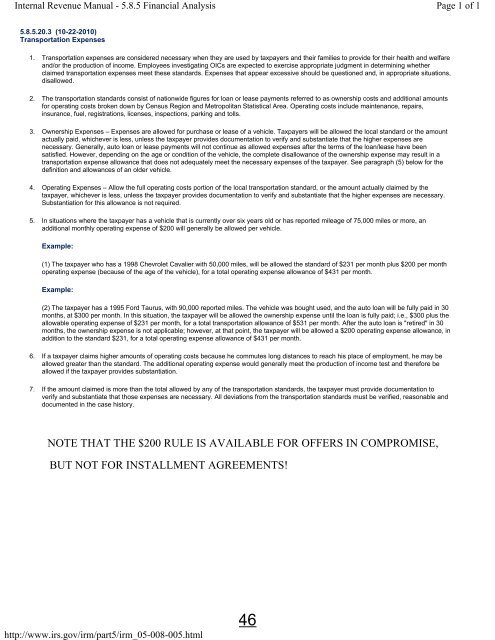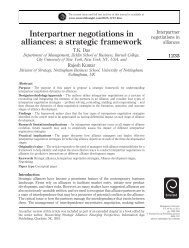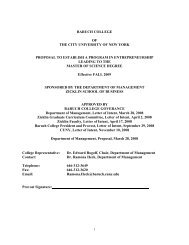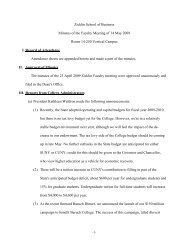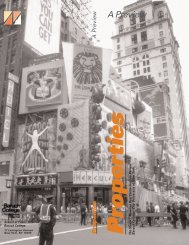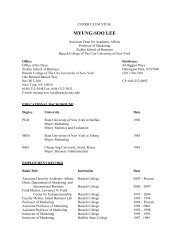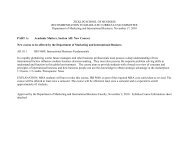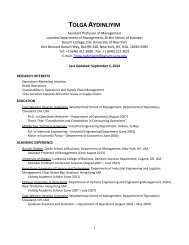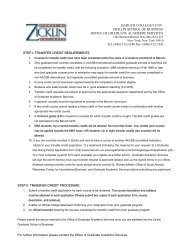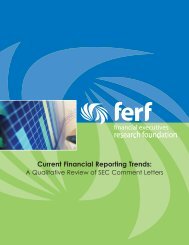Tax Seminar #3 – December 3 2012
Workbook - Zicklin School of Business
Workbook - Zicklin School of Business
Create successful ePaper yourself
Turn your PDF publications into a flip-book with our unique Google optimized e-Paper software.
Internal Revenue Manual - 5.8.5 Financial Analysis<br />
Page 1 of 1<br />
5.8.5.20.3 (10-22-2010)<br />
Transportation Expenses<br />
1. Transportation expenses are considered necessary when they are used by taxpayers and their families to provide for their health and welfare<br />
and/or the production of income. Employees investigating OICs are expected to exercise appropriate judgment in determining whether<br />
claimed transportation expenses meet these standards. Expenses that appear excessive should be questioned and, in appropriate situations,<br />
disallowed.<br />
2. The transportation standards consist of nationwide figures for loan or lease payments referred to as ownership costs and additional amounts<br />
for operating costs broken down by Census Region and Metropolitan Statistical Area. Operating costs include maintenance, repairs,<br />
insurance, fuel, registrations, licenses, inspections, parking and tolls.<br />
3. Ownership Expenses <strong>–</strong> Expenses are allowed for purchase or lease of a vehicle. <strong>Tax</strong>payers will be allowed the local standard or the amount<br />
actually paid, whichever is less, unless the taxpayer provides documentation to verify and substantiate that the higher expenses are<br />
necessary. Generally, auto loan or lease payments will not continue as allowed expenses after the terms of the loan/lease have been<br />
satisfied. However, depending on the age or condition of the vehicle, the complete disallowance of the ownership expense may result in a<br />
transportation expense allowance that does not adequately meet the necessary expenses of the taxpayer. See paragraph (5) below for the<br />
definition and allowances of an older vehicle.<br />
4. Operating Expenses <strong>–</strong> Allow the full operating costs portion of the local transportation standard, or the amount actually claimed by the<br />
taxpayer, whichever is less, unless the taxpayer provides documentation to verify and substantiate that the higher expenses are necessary.<br />
Substantiation for this allowance is not required.<br />
5. In situations where the taxpayer has a vehicle that is currently over six years old or has reported mileage of 75,000 miles or more, an<br />
additional monthly operating expense of $200 will generally be allowed per vehicle.<br />
Example:<br />
(1) The taxpayer who has a 1998 Chevrolet Cavalier with 50,000 miles, will be allowed the standard of $231 per month plus $200 per month<br />
operating expense (because of the age of the vehicle), for a total operating expense allowance of $431 per month.<br />
Example:<br />
(2) The taxpayer has a 1995 Ford Taurus, with 90,000 reported miles. The vehicle was bought used, and the auto loan will be fully paid in 30<br />
months, at $300 per month. In this situation, the taxpayer will be allowed the ownership expense until the loan is fully paid; i.e., $300 plus the<br />
allowable operating expense of $231 per month, for a total transportation allowance of $531 per month. After the auto loan is "retired" in 30<br />
months, the ownership expense is not applicable; however, at that point, the taxpayer will be allowed a $200 operating expense allowance, in<br />
addition to the standard $231, for a total operating expense allowance of $431 per month.<br />
6. If a taxpayer claims higher amounts of operating costs because he commutes long distances to reach his place of employment, he may be<br />
allowed greater than the standard. The additional operating expense would generally meet the production of income test and therefore be<br />
allowed if the taxpayer provides substantiation.<br />
7. If the amount claimed is more than the total allowed by any of the transportation standards, the taxpayer must provide documentation to<br />
verify and substantiate that those expenses are necessary. All deviations from the transportation standards must be verified, reasonable and<br />
documented in the case history.<br />
http://www.irs.gov/irm/part5/irm_05-008-005.html<br />
46


